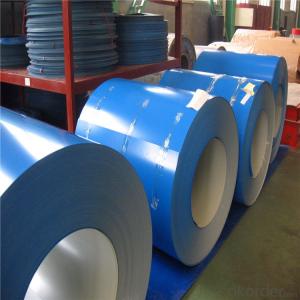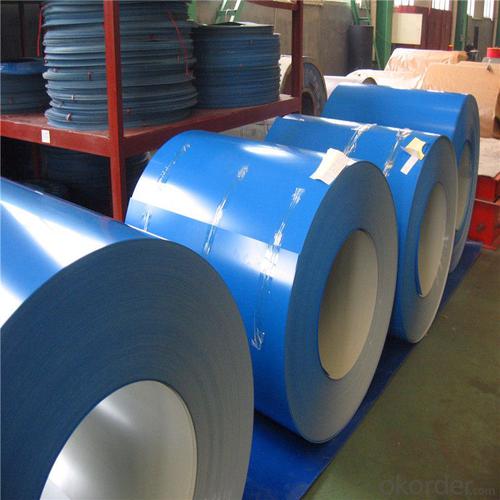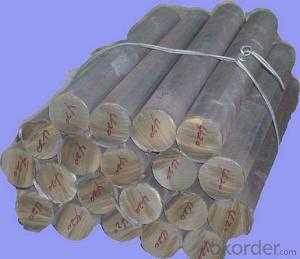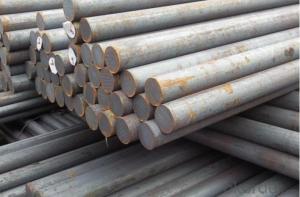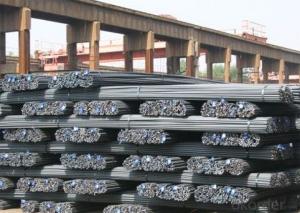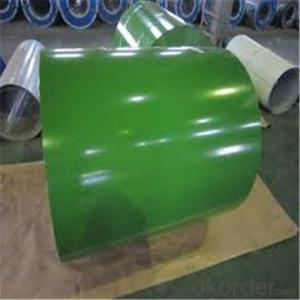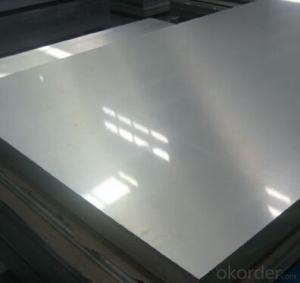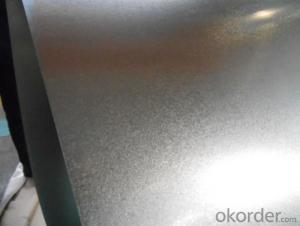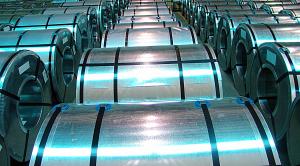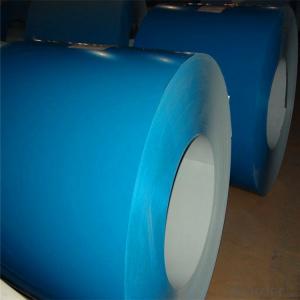Aluzinc Galvanized Steel Coils (for Ventilated Duct)
- Loading Port:
- Tianjin
- Payment Terms:
- TT OR LC
- Min Order Qty:
- 100 m.t.
- Supply Capability:
- 500000 m.t./month
OKorder Service Pledge
OKorder Financial Service
You Might Also Like
Specification
Aluzinc Galvanized Steel Coils (for Ventilated Duct)
Description of Aluzinc Galvanized Steel Coils (for Ventilated Duct)
Product | PPGI/PPGL |
Capacity | 5,000 tons/month |
Base material | Hot dipped galvanized steel |
Thickness | 0.2-2.0mm |
Width | 600-1250mm(according to your need) |
Coil Weight | 3-6tons |
Quality | SGCC, DX51D |
Color | RAL No. or customers samples’ color |
Zinc-coating | 30g/m2-180g/m2 |
Coil ID | 508mm/610mm |
Technique | Cold rolled—hot dipped galvanized—color coated |
Painting | Top painting:15~25μm |
Back painting: 6~10μm | |
Tolerance | Thickness: +/-0.02mm |
Width:+/-2mm | |
Shipment time | within 15-45 workdays |
Payment | T/T, L/C at sight |
Packing | Standard export packing |
The special order can be negotiated. | |
Application of Aluzinc Galvanized Steel Coils (for Ventilated Duct)
APPLICATION OF OUR PREPAINTED STEEL | ||||||||||
Construction | Outside | Workshop,agricultural warehouse,residential precast unit | ||||||||
corrugated roof,roller shutter door,rainwater drainage pipe,retailer booth | ||||||||||
Inside | Door,doorcase,light steel roof stucture,folding screen,elevator,stairway,ven gutter,Construction Wall | |||||||||
Electrical applicance | Refrigerator,washer,switch cabnet,instrument cabinet,air conditioning,micro-wave owen,bread maker | |||||||||
Fuiniture | Central heating slice,lampshade,chifforobe,desk,bed,locker,bookself | |||||||||
Carrying trade | Exterior decoration of auto and train,clapboard,container,isolation lairage,isolation board | |||||||||
Qthers | Writing panel,garbagecan,billboard,timekeeper,typewriter,instrument panel,weight sensor,photographic equipment | |||||||||
Products Show of Aluzinc Galvanized Steel Coils (for Ventilated Duct)

Product Advantages
1.With nearly 20 years experience in prepainted steel, accommodate different marketdemands. | ||||||||||||||
2.'Quality first, service first' is our business aim; 'The good faith get respect,cast quality market' is our Business philosophy . | ||||||||||||||
3.Having two series producttion line,with the abbual production capacity of 240000 tons. | ||||||||||||||
4.Exceed International ISO9001:2008&ISO14001:2004 quality and environmental standards | ||||||||||||||
5.Meet with ROHS standard |
Company Information
CNBM International Corporation is the most important trading platform of CNBM group.
Whith its advantages, CNBM International are mainly concentrate on Cement, Glass, Iron and Steel, Ceramics industries and devotes herself for supplying high qulity series of refractories as well as technical consultancies and logistics solutions.


F A Q
1, Your advantages?
professional products inquiry, products knowledge train (for agents), smooth goods delivery, excellent customer solution proposale
2, Test & Certificate?
SGS test is available, customer inspection before shipping is welcome, third party inspection is no problem
3, Factory or Trading Company?
CNBM is a trading company but we have so many protocol factories and CNBM works as a trading department of these factories. Also CNBM is the holding company of many factories.
4, Payment Terms?
30% TT as deposit and 70% before delivery.
Irrevocable L/C at sight.
5, Trading Terms?
EXW, FOB, CIF, FFR, CNF
6, After-sale Service?
CNBM provides the services and support you need for every step of our cooperation. We're the business partner you can trust.
For any problem, please kindly contact us at any your convenient time.
We'll reply you in our first priority within 24 hours.
- Q: How does special steel contribute to the aerospace aftermarket industry?
- Special steel plays a crucial role in the aerospace aftermarket industry by providing high-quality materials that meet the demanding requirements of aircraft maintenance and repair. It is used in various aircraft components, such as engine parts, landing gear, and structural elements, where exceptional strength, corrosion resistance, and heat resistance are necessary. Special steel ensures the durability and reliability of these components, allowing for safer and more efficient flight operations. Additionally, its use in the aerospace aftermarket industry helps reduce maintenance costs and downtime, as it enables longer-lasting and more robust aircraft components.
- Q: What are the properties of leaded steel?
- Leaded steel is a type of steel that contains a small amount of lead as an alloying element. The addition of lead enhances the machinability and chip formation properties of the steel. Leaded steel has improved cutting and drilling capabilities, making it easier to work with during machining operations. However, it also reduces the strength and hardness of the steel, which may limit its use in certain applications where high strength is required. Additionally, the presence of lead can pose health and environmental risks, so proper safety measures should be taken when handling and disposing of leaded steel.
- Q: How does special steel contribute to the agricultural sector?
- Special steel contributes to the agricultural sector by providing durable and high-quality materials for various agricultural machinery and equipment. It enhances the performance and longevity of farming tools like plows, harrows, and combine harvesters, making them more resistant to wear and tear. Special steel also supports the construction of storage facilities, irrigation systems, and infrastructure in agriculture, ensuring improved efficiency and productivity in the sector.
- Q: Can special steel be used in the telecommunications equipment manufacturing industry?
- Yes, special steel can be used in the telecommunications equipment manufacturing industry. Special steel, such as stainless steel or alloy steel, offers various advantages such as high strength, corrosion resistance, and heat resistance. These properties make it suitable for manufacturing various components used in telecommunications equipment, including antennas, towers, cable connectors, and enclosures. Additionally, the use of special steel can enhance the durability and performance of the equipment in challenging environments, such as extreme temperatures or exposure to harsh weather conditions.
- Q: What are the different methods of testing the mechanical properties of special steel?
- There are several methods used to test the mechanical properties of special steel. These methods aim to determine the strength, hardness, ductility, and other characteristics of the steel. Some common methods include: 1. Tensile Testing: This is the most common method used to determine the tensile strength of steel. A sample is subjected to a gradually increasing tensile force until it breaks. The force and elongation measurements are used to calculate properties such as ultimate tensile strength, yield strength, and elongation. 2. Hardness Testing: This method measures the resistance of steel to indentation or scratching. Common hardness tests include Rockwell, Brinell, and Vickers hardness tests. These tests provide information about the steel's ability to withstand deformation, wear, or penetration. 3. Impact Testing: This method evaluates the steel's ability to absorb energy during sudden impact or shock loading. The Charpy and Izod tests are commonly used to measure the impact toughness of steel. These tests involve striking a notched sample with a pendulum and measuring the energy absorbed during fracture. 4. Bend Testing: This method is used to assess the ductility and flexibility of steel. A sample is bent to a specific angle or radius until it fractures. The bend test helps determine the steel's ability to endure bending or forming processes without failure. 5. Fatigue Testing: This method evaluates the steel's resistance to repeated cyclic loading. Fatigue tests involve subjecting a sample to varying levels of stress for a specified number of cycles until failure. This helps determine the steel's endurance limit and fatigue strength. 6. Microhardness Testing: This technique measures the hardness of small localized areas on the steel's surface. It is useful for evaluating surface treatments, case hardening, and assessing the effects of heat treatment. 7. Non-Destructive Testing (NDT): These methods allow testing without damaging the steel. Common NDT techniques include ultrasonic testing, magnetic particle testing, eddy current testing, and radiographic testing. NDT methods are used to detect internal defects, cracks, or discontinuities that may affect the steel's mechanical properties. These various testing methods provide valuable information about the mechanical properties of special steel, assisting in quality control, material selection, and ensuring the steel meets the required standards and specifications.
- Q: What are the different methods for improving the toughness of special steel?
- There are multiple approaches that can be utilized to enhance the toughness of special steel. Among the most effective techniques is the utilization of alloying. By incorporating specific elements like nickel, chromium, or molybdenum into the steel composition, the toughness can be greatly enhanced. These alloying elements aid in increasing the strength and resistance to cracking and fracture. Another method involves employing heat treatment processes. For instance, one can utilize quenching and tempering to improve the toughness of the steel. Quenching entails rapidly cooling the steel from a high temperature to room temperature, resulting in a hardened structure. Subsequently, tempering takes place, where the steel is reheated to a precise temperature and then slowly cooled. This process helps alleviate internal stresses and enhance the toughness of the steel. Furthermore, refining the microstructure of the steel can also amplify its toughness. Techniques like grain refinement, which encompass reducing the size of the grains in the steel, can lead to improved toughness. This is due to the fact that smaller grains hinder the propagation of cracks, making the steel more resistant to fracture. Lastly, special steel can undergo processes such as shot peening or surface hardening to augment its toughness. Shot peening involves bombarding the steel's surface with tiny metallic or ceramic particles, inducing compressive stresses and enhancing resistance to crack initiation. Surface hardening techniques like carburizing or nitriding can generate a hardened layer on the steel's surface, increasing its toughness and wear resistance. In conclusion, the various methods for enhancing the toughness of special steel encompass alloying, heat treatment processes, microstructure refinement, and surface treatments. Each of these techniques can be customized to meet the specific requirements of the steel and achieve the desired level of toughness.
- Q: Can special steel be used in the medical industry?
- Yes, special steel can be used in the medical industry. It is commonly employed in the production of surgical instruments, medical implants, and equipment due to its high strength, corrosion resistance, and biocompatibility. Special steel alloys, such as stainless steel and titanium alloys, are extensively utilized in various medical applications to ensure patient safety and enhance the effectiveness of medical procedures.
- Q: What are the different methods of surface coating for special steel?
- There are several methods of surface coating for special steel. Some common methods include electroplating, hot-dip galvanizing, powder coating, and thermal spraying. Each method offers unique benefits and is chosen based on the specific requirements of the steel application. Electroplating involves depositing a layer of metal onto the steel surface through an electrolytic process. Hot-dip galvanizing involves immersing the steel in a molten zinc bath to form a protective coating. Powder coating involves applying a dry powder onto the steel surface which is then cured to create a durable finish. Thermal spraying involves spraying a molten or powdered material onto the steel surface to create a protective coating.
- Q: How does special steel contribute to the efficiency of industrial equipment?
- Special steel contributes to the efficiency of industrial equipment by offering superior strength, durability, and resistance to wear and tear. Its unique properties enable the production of lighter and more compact equipment, resulting in reduced energy consumption, increased productivity, and improved overall performance. Additionally, special steel's high corrosion resistance helps to prolong the lifespan of industrial equipment, reducing maintenance costs and enhancing operational efficiency.
- Q: What are the main applications of special steel in the mining transportation?
- Special steel is extensively used in mining transportation for various applications. The main applications include manufacturing durable and high-strength components such as drill bits, conveyor belts, and mining equipment parts. Special steel's exceptional resistance to wear, corrosion, and impact makes it an ideal choice for these demanding environments. Additionally, special steel is used in the construction of infrastructure, such as bridges and railway tracks, ensuring the safe and efficient transportation of mined materials.
Send your message to us
Aluzinc Galvanized Steel Coils (for Ventilated Duct)
- Loading Port:
- Tianjin
- Payment Terms:
- TT OR LC
- Min Order Qty:
- 100 m.t.
- Supply Capability:
- 500000 m.t./month
OKorder Service Pledge
OKorder Financial Service
Similar products
Hot products
Hot Searches
Related keywords
